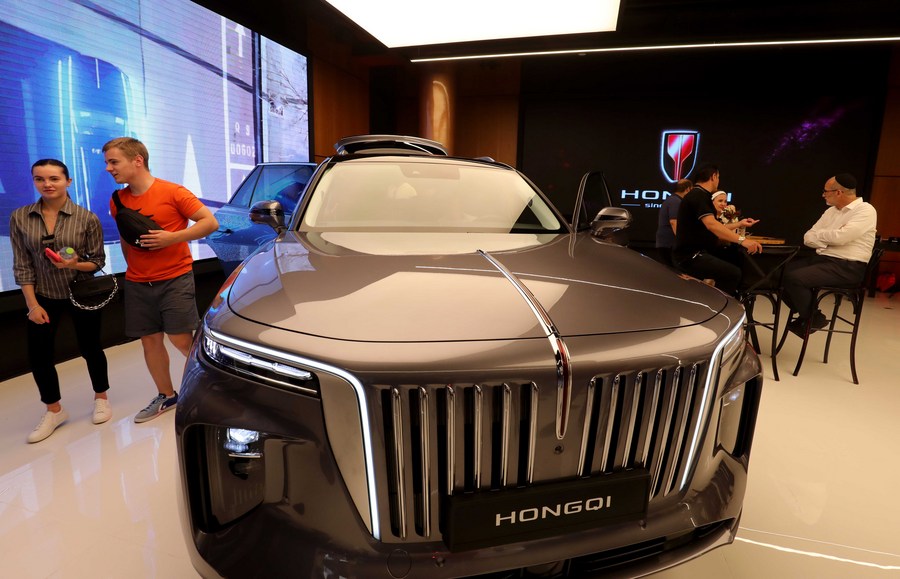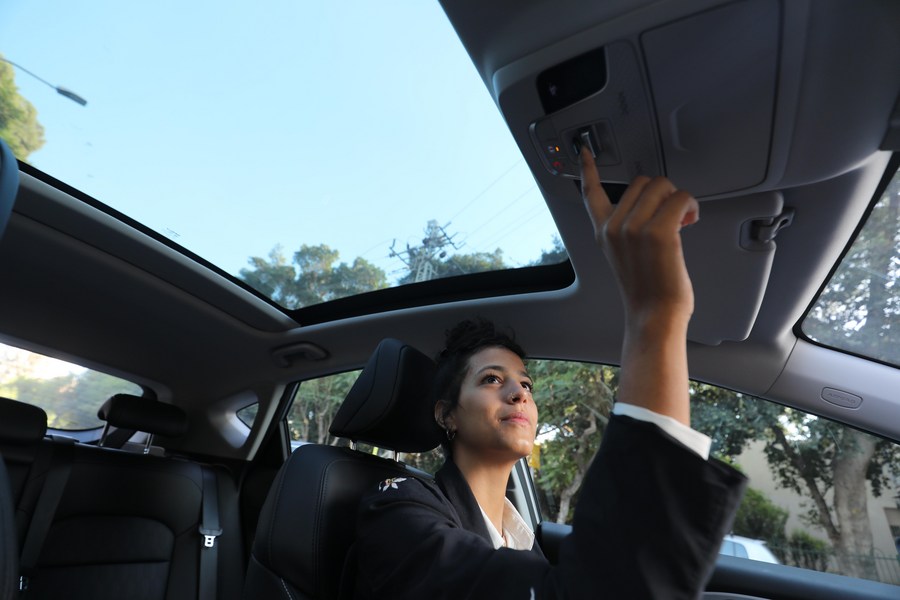
The Hongqi E-HS9 model, a pure-electric luxury SUV, is showcased at the first showroom for China’s limousine brand Hongqi in Tel Aviv, Israel, June 28, 2022. (Photo by Gil Cohen Magen/Xinhua)
JERUSALEM, Feb. 14 (Xinhua) — Chinese electric cars have taken Israel by storm in a short period of time, as according to the latest figures issued by the Israel Vehicle Importers Association, China jumped to Israel’s largest supplier of imported passenger cars in January, with 7,753 units sold in the month, up from only 685 last year.
With almost 3,000 units sold in Israel in January, the electric model Atto 3 manufactured by China’s BYD Auto, which only began sales in Israel in October 2022, is now the best-selling electric car in the country.
For the entire year of 2022, the Geometry C electric model, manufactured by China’s automaker Geely Auto Group, was crowned the best-selling electric vehicle in Israel with 6,818 units sold.

A staff member shows an electric car made by China’s Geely Auto in Tel Aviv, Israel, on Nov. 10, 2021. (Photo by Gil Cohen Magen/Xinhua)
According to Israeli experts and importers, advanced technologies, higher availability and better configuration are the three main reasons for the success of Chinese electric vehicles in the Israeli market.
« China is far ahead of Europe and the United States in key core technologies such as pure electric vehicle platforms, fuel cell vehicles, power batteries, and third-generation semiconductors, » Ronen Yablon, general manager of Geely Israel, told Xinhua.
Chinese electric vehicles are offered in Israel with almost immediate supply, while other models require a waiting time of at least several months, said Sharon Baider, an Israeli public relations specialist in the automotive field.
« Most Chinese vehicles are significantly more spacious than South Korean or Tesla cars » and have additional luxury equipment, Baider added.
« China is the pioneer in the field and therefore has the biggest experience in manufacturing electric vehicles, » said Gilad Dagan, vice president of Strategy and Business Development at the Israeli dealership Samelet which imports the Chinese Wey and Hongqi electric cars.

An Israeli car company worker shows an electric car made by Chinese automaker Skyworth Auto in Rishon Lezion, Israel, Oct. 27, 2021. (Photo by Gil Cohen Magen/Xinhua)
« China’s new energy auto industry is now at the forefront of the world in terms of growth rate, car ownership, and industrial support system. Its performance is remarkable for the whole world, » Yablon agreed.
Despite their current leadership in the electric vehicle field, experts suggest Chinese companies further improve their brand recognition in comparison with those that entered the global market much earlier.
On the other hand, as the new energy vehicle industry develops and matures, China’s auto industry will face more challenges, such as rising battery costs and electricity prices, as well as fiercer competition from other car brands, Yablon said.

People visit a car company selling electric cars made by China’s Geely Auto in Tel Aviv, Israel, on Nov. 10, 2021. (Photo by Gil Cohen Magen/Xinhua)
Commenting on the potential trend of the industry, Yablon foresees a new era soon when all cars will be produced with zero emissions, while Dan Hermann, head of the Automotive Engineering Specialty Program at the Afeka Academic College of Engineering, predicts that « something with hydrogen will eventually push the batteries out. »
« Batteries have a limited capacity, high-cost, high weight, and vehicles eventually will be limited in range, especially when looking at heavy vehicles that need to go long distances, like trucks, » Hermann explained.
« In the future, Chinese auto brands will play a more important role on the global automotive stage and lead the development, » Yablon concluded. ■










